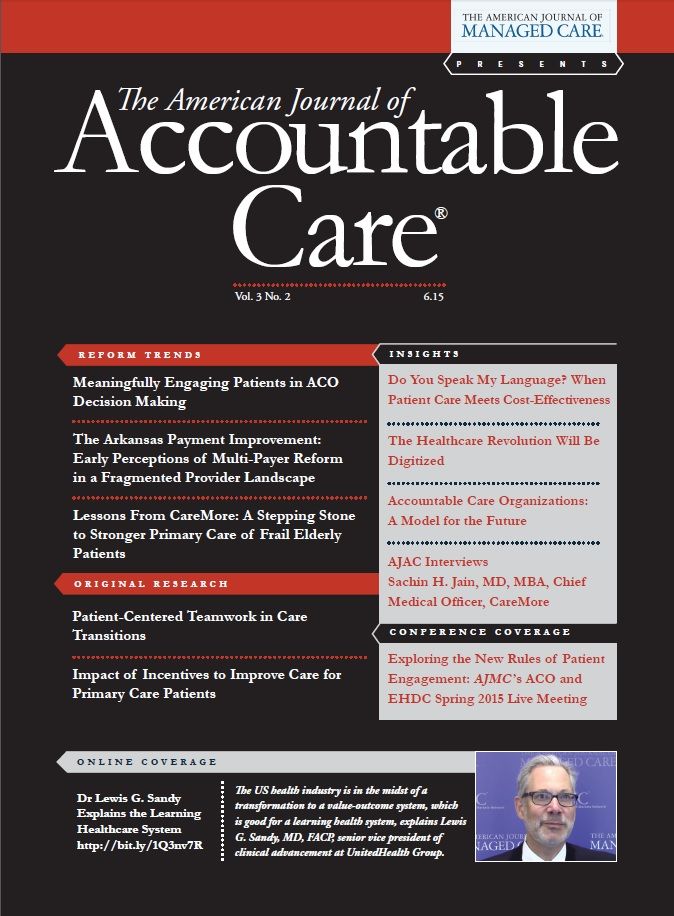- Center on Health Equity & Access
- Clinical
- Health Care Cost
- Health Care Delivery
- Insurance
- Policy
- Technology
- Value-Based Care
Communication and Accountable Care
As the US healthcare system transitions from volume to value, there is some concern that while new payment models and reforms may be neither conceptually flawed nor badly designed, the implementation of these reforms may be insufficient to fully achieve any potential success. If we get the architectural plan right but our building materials and methods are flawed, we wind up with a disappointing result.
As the US healthcare system transitions from volume to value, there is some concern that while new payment models and reforms may be neither conceptually flawed nor badly designed, the implementation of these reforms may be insufficient to fully achieve any potential success. If we get the architectural plan right but our building materials and methods are flawed, we wind up with a disappointing result.
Providers are under significant pressure to improve the quality and efficiency of care. They are changing how they relate to one another and to the organizations in which they work, as well as thoroughly rethinking business practices. Making the vision of accountable care a reality is an enormous task and there are so many components and calibrations. Communication is among the most important.
In this June issue of The American Journal of Accountable Care, Drs José A. Pagán and Brendan Saloner note the importance of communication in new payment models in “Do You Speak My Language? When Patient Care Meets Cost-Effectiveness.” They focus on what can sometimes be a disconnect in the terminology that frames reform and point out the need for system translators with fluency in both the language of economics and patient care in order to facilitate the interaction between physicians and health system leaders in order to assure that all stakeholders’ understandings and expectations are aligned. The authors view this type of translation as essential to the widespread adoption of innovation.
The key role of effective organizational communication is also discussed by Lise Rybowski and her coauthors in their article, “Impact of Incentives to Improve Care for Primary Care Patients.” They find that, among other program design issues, a dearth of ongoing communication related to a pay-for-performance program’s purpose, available support and goals and was a major hindrance to successful implementation. Reaching the target audience is key for the success of any incentive, and in this case, many providers charged with care improvement were not adequately informed.
By contrast, successful communication between stakeholders has been a hallmark of both the design and implementation of payment reform in Arkansas, as detailed in “The Arkansas Payment Improvement Initiative: Early Perceptions of Multi-Payer Reform in a Fragmented Provider Landscape.” While the results to date are early ones, the effort of both the state’s public and private sectors to explain the concepts behind the initiative and development of its episodic payment and patient-centered medical home components has been notable. We and our coauthors found there to be a significant degree of “buy-in” and understanding of program goals and incentives. Given the scope of the undertaking and the potential pitfalls detailed elsewhere in this issue, this is no small achievement.

Empowering Children and Parents Through Technology: Opportunities, Challenges, and Future Directions
January 15th 2026Digital health platforms improve pediatric care by offering customized, interactive tools for children and parents. They enhance education, support, and engagement while tackling challenges related to access, usability, and privacy.
Read More
Insights Into Patient Portal Engagement Leveraging Observational Electronic Health Data
January 12th 2026This analysis of more than 250,000 adults at least 50 years old with chronic conditions showed lower portal use among older, non–English-speaking, and Black patients, underscoring digital health equity gaps.
Read More
Subjective and Objective Impacts of Ambulatory AI Scribes
January 8th 2026Although the vast majority of physicians using an artificial intelligence (AI) scribe perceived a reduction in documentation time, those with the most actual time savings had higher relative baseline levels of documentation time.
Read More
Telehealth Intervention by Pharmacists Collaboratively Enhances Hypertension Management and Outcomes
January 7th 2026Patient interaction and enhanced support with clinical pharmacists significantly improved pass rates for a measure of controlling blood pressure compared with usual care.
Read More

